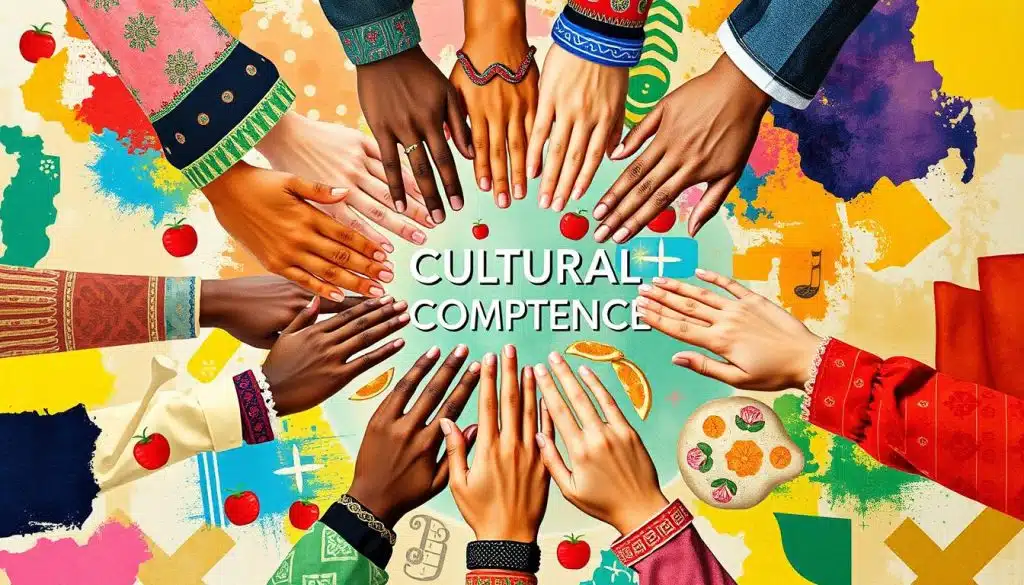In today’s world, knowing about different cultures is key. This is true for many jobs, especially in social work. But what is cultural competence in social work, and why is it so important? Let’s find out.
Cultural competence means you can talk, work, and connect with people from all cultures. It’s about knowing and respecting different beliefs and ways of life. So, why is it so important for social workers?
Are you ready to improve your cultural competence? Let’s explore why it matters in social work. We’ll also look at ways to boost your own skills.
Cultural competence is an essential aspect of effective practice in social work, as it promotes understanding and sensitivity to the diverse backgrounds of clients. At its core, cultural competence in social work refers to the ability of practitioners to interact effectively with individuals from various cultural, ethnic, and social backgrounds. This encompasses recognizing one’s own cultural biases, understanding the cultural contexts of clients, and employing this knowledge to guide interventions and support. In a field that serves a wide range of populations, social workers must prioritize cultural competence to ensure they are meeting clients’ needs holistically and respectfully.
Why is cultural competence important in social work? The answer lies in the significant impact that cultural factors have on clients’ experiences and challenges. When social workers possess cultural competence, they can tailor their approaches to align with the values, beliefs, and practices of the individuals they serve. This not only enhances the therapeutic relationship but also improves treatment outcomes. Clients are more likely to engage openly with professionals who demonstrate an understanding of their cultural background, leading to a more effective and collaborative process.
Moreover, cultural competence is crucial in addressing systemic inequalities and injustices prevalent in society. Social workers are often at the forefront of advocating for marginalized communities, and an understanding of cultural nuances helps them identify and challenge oppressive structures. By recognizing the intersectionality of various identities, social workers can play a key role in promoting social justice and ensuring that all voices are heard in the planning and execution of social services. In this way, cultural competence social work is not just a skill; it is a vital approach to fostering equity within the community.
In conclusion, social work cultural competence is an indispensable element of successful social work practice. It enables social workers to build trust and rapport with clients, tailor interventions based on cultural understanding, and challenge systemic inequities. As the world continues to grow more diverse, fostering cultural competence will remain a fundamental responsibility for social workers committed to acting ethically and effectively in their practice. Embracing this vital aspect of social work not only enhances individual client experiences but also contributes to a more just and equitable society overall.
Cultural competence is key in today’s diverse world. It means being able to talk and work well with people from different cultures. It’s about understanding and valuing the beliefs, values, and customs of various cultures.
Cultural competence is a non-linear, dynamic process that needs constant learning and self-reflection. It helps people and groups work well together across cultures. It builds understanding and creates inclusive spaces.
Betancourt (2004) said culture is a set of learned beliefs, values, and behaviors in a group. It includes language, communication styles, practices, customs, and views on roles and relationships.
Muzychenko (2008) pointed out the importance of cultural intelligence in understanding unfamiliar cultures. Chao, Okazaki, and Hong (2011) stressed the need for reflective awareness of cultural influences on thoughts and behaviors. Wilson, Ward, and Fischer (2013) defined cultural competence as gaining and keeping culture-specific skills for effective interaction with diverse cultures.
In the end, cultural competence is the base for meaningful interactions across cultures. It helps individuals and organizations deal with the complexities of our globalized world.

“Cultural competence is a non-linear, dynamic process that requires ongoing learning and self-reflection.” – Burchum (2002)
Learning about different cultures is key in today’s world. It lets us talk and work well with people from various backgrounds. This skill is vital for better healthcare and social services.
Being culturally competent means we can include everyone more easily. It helps us avoid stereotypes and work better with diverse groups. This is especially important in the Human Services field, where empathy and respect are crucial.
Workers in Human Services often meet people from different cultures. They need to keep learning about these cultures to grow in their careers. Being humble and open to learning from clients is essential.
Knowing our own biases is a big part of being culturally competent. Getting more education, like a graduate degree in counseling, helps us understand and work with different cultures better.
| Importance of Cultural Competence | Statistics |
|---|---|
| Disparities in access to quality care |
|
| Impact on health outcomes |
|
In conclusion, cultural competence is very important. It’s a key skill for professionals in the Human Services field and others. It helps us build trust, improve services, and achieve better results for everyone.

Improving your cultural competence is a journey that opens doors to understanding and respect. It helps you move through different cultures with empathy and knowledge. Here are some steps to help you grow in this area:
By taking these steps, you’ll gain a deeper respect and understanding for cultural differences. This will help you connect with people from all over the world more effectively.
| Key Steps to Increase Cultural Competence | Benefits of Developing Cultural Competence |
|---|---|
|
|
Remember, cultural competence is an ongoing process that needs dedication and continuous effort. By sticking to these strategies, you’ll become better at connecting with people from different cultures.
Creating a culture of cultural competence is key for success in today’s diverse business world. Organizations can start by launching various initiatives to grow this skill in their teams.
Leaders can lead by starting diversity and inclusion training programs. These workshops teach employees to understand cultural differences, improve communication across cultures, and work well in diverse teams. Studies show that culturally aware leaders lead to more innovation, teamwork, and job happiness.
Also, hiring a diverse team that mirrors the communities served is important. This enriches the company culture and helps understand and meet the needs of different clients. Having culturally competent management boosts employee happiness, creativity, teamwork, and profits.
Creating policies that respect different cultures is also vital. This means offering language support, respecting religious and cultural holidays, and making sure everyone’s voice is heard. Working on cultural skills takes effort but leads to a more inclusive and peaceful workplace.
People can also work on their cultural competence. Experiences like traveling, learning new languages, or attending cultural events can widen perspectives. Technology, like mobile apps, can also help understand cultural differences in nearly 100 countries.
Reflecting on oneself and learning about different cultures is essential. Managers who care and respect their team members help build trust and unity across cultures. Being open and curious helps individuals better understand and work with people from different backgrounds.
| Organizational Initiatives | Individual Efforts |
|---|---|
|
|
“Culturally competent leadership fosters more significant innovation, collaboration, and job satisfaction.”
Developing cultural competence brings many benefits for both individuals and organizations. It helps us understand and appreciate different cultures. This understanding can greatly improve our personal and professional lives.
One key advantage is improved communication. Being culturally competent helps us navigate interactions with people from other cultures. This leads to better dialogue and more satisfied patients or clients, especially in healthcare.
Cultural competence also boosts our problem-solving and decision-making skills. It allows us to consider different perspectives and cultural nuances. This way, we make better choices and reduce healthcare disparities and errors.
Moreover, it promotes greater inclusion and mutual understanding in diverse settings. This leads to more effective collaboration and teamwork. People from different backgrounds feel valued and respected, contributing their unique skills.
Investing in cultural competence is a smart choice. It benefits us personally and strengthens our organizations and communities. By embracing cultural competence, we create inclusive, innovative, and thriving environments for everyone.
Cultivating cultural competence is key in today’s diverse world. It helps us build stronger relationships and provide better services. By understanding and respecting different cultures, we can make our environments more inclusive and productive.
Understanding cultural differences is crucial. It helps address health disparities and improves workplace collaboration. As our societies grow more multicultural, this skill will become even more important.
Research shows we need cultural competence now more than ever. There are big gaps in health care and literacy among diverse groups. To fix these, we must boost cultural awareness and empower marginalized communities.
Investing in cultural competence training can greatly improve health outcomes and customer experiences. It leads to a better life for everyone.